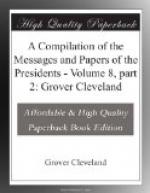First. It is by no means clear that even if the existing system of duties on imports is continued without modification those duties alone will yield sufficient revenue for all the needs of the Government. It is estimated that $100,000,000 will be required for pensions during the coming year, and it may well be doubted whether the maximum annual demand for that object has yet been reached. Uncertainty upon this question would alone justify, in my judgment, the retention for the present of that portion of the system of internal revenue which is least objectionable to the people.
Second. A total abolition of excise taxes would almost inevitably prove a serious if not an insurmountable obstacle to a thorough revision of the tariff and to any considerable reduction in import duties.
The present tariff system is in many respects unjust. It makes unequal distributions both of its burdens and its benefits. This fact was practically recognized by a majority of each House of Congress in the passage of the act creating the Tariff Commission. The report of that commission will be placed before you at the beginning of this session, and will, I trust, afford you such information as to the condition and prospects of the various commercial, agricultural, manufacturing, mining, and other interests of the country and contain such suggestions for statutory revision as will practically aid your action upon this important subject.
The revenue from customs for the fiscal year ended June 30, 1879, amounted to $137,000,000.
It has in the three succeeding years reached, first, $186,000,000, then $198,000,000, and finally, as has been already stated, $220,000,000.
The income from this source for the fiscal year which will end on June 30, 1883, will doubtless be considerably in excess of the sum last mentioned.
If the tax on domestic spirits is to be retained, it is plain, therefore, that large reductions from the customs revenue are entirely feasible. While recommending this reduction, I am far from advising the abandonment of the policy of so discriminating in the adjustment of details as to afford aid and protection to domestic labor. But the present system should be so revised as to equalize the public burden among all classes and occupations and bring it into closer harmony with the present needs of industry.
Without entering into minute detail, which under present circumstances is quite unnecessary, I recommend an enlargement of the free list so as to include within it the numerous articles which yield inconsiderable revenue, a simplification of the complex and inconsistent schedule of duties upon certain manufactures, particularly those of cotton, iron, and steel, and a substantial reduction of the duties upon those articles and upon sugar, molasses, silk, wool, and woolen goods.
If a general revision of the tariff shall be found to be impracticable at this session, I express the hope that at least some of the more conspicuous inequalities of the present law may be corrected before your final adjournment. One of them is specially referred to by the Secretary. In view of a recent decision of the Supreme Court, the necessity of amending the law by which the Dutch standard of color is adopted as the test of the saccharine strength of sugars is too obvious to require comment.




